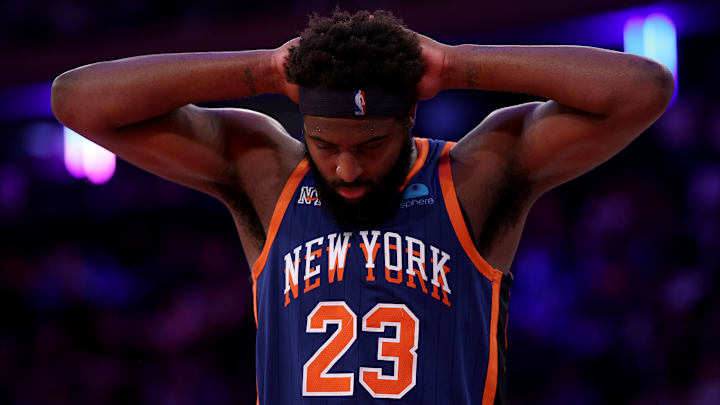On the heels of signing Mikal Bridges to a (shockingly divisive) four-year, $150 million extension, the New York Knicks’ have one more mission-critical job to get done: figuring out the future of Mitchell Robinson.
The 27-year-old big man is entering the final season of his current contract, and eligible to sign a four-year deal worth a maximum of almost $87 million—assuming the salary cap increases by 7 percent after the 2025-26 campaign. Robinson’s injury may lend itself to the Knicks waiting to discuss a new deal. His defensive value and offensive-rebounding prowess are undeniable, but he has played in a combined 48 games over the past two seasons, and is averaging 46 absences per year since 2022-23.
Still, letting perhaps their best defensive player hit the open market is all sorts of risky. More teams will have cap space next summer, and it only takes one to offer enough years and guaranteed money for Robinson to leave.
All of this was stuff New York needed to wrap its head around prior to Bridges’ extension. After signing him, though, there’s even more to think about.
The Knicks have a better chance of staying out of the second apron in 2026-27
Though Bridges only took around $6 million less than he could have received, it’s enough of a pay cut to make the second-apron discussion more interesting. It was always assumed the Knicks would cannonball into it during the 2026-27 season. They still might. But they also have a better chance of ducking it altogether.
If Guerschon Yabusele picks up his player option after next year, the Knicks will have around $15.6 million in room beneath the second apron. That does not include a new salary for Robinson, and that flexibility only accounts for nine roster spots. New York would need to fill out another five.
Even if the Knicks burn four of those spots on minimum-contract rookies, they won’t have nearly enough breathing room left to re-sign Robinson and skirt the second apron. The team’s flexibility also thins out further if Yabusele opts out, and returns on a non-Bird salary that pays him $6.6 million.
New York must be mindful of midseason trade assets
The Knicks must also consider the cost of a Robinson extension from this year’s perspective. If he signs a deal that gives him more than a 20 percent raise, he can’t be traded for six months. Bridges is already subject to that same restriction, and given that it doesn’t lift until five days before the Feb. 5 deadline, he’s very close to being ineligible.
Adding that same limitation to Robinson hollows out the Knicks’ already-bare asset stores. They cannot trade a first-round pick until next summer, and their youngsters are neither appealing enough nor expensive enough to function as centerpieces in meaningful swaps.
Assuming New York doesn’t want to deal Jalen Brunson, Karl-Anthony Towns, or OG Anunoby, Robinson’s $13 million expiring salary just became the team’s best trade chip. Even if the front office isn’t intending to make substantial midseason changes, it must be cognizant of removing its most appealing transaction magnet from the table. Plus, we know the Knicks are among the teams keeping tabs on Giannis Antetokounmpo’s availability, and the Bridges' extension could already compromise that pursuit.
What happens from here is anyone’s guess. The right answer isn’t crystal clear. There may be more than one. The one thing we know for sure is that whatever the Knicks do, it won’t be an easy decision—or without risk.
